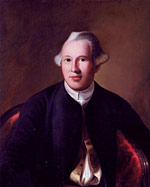“Boston, June 15,1774
Sir, – This afternoon was a meeting of a considerable number of the tradesmen of this town; but, after some altercations, they dissolved themselves without coming to any resolutions, for which I am very sorry, as we had some expectations from the meeting. We are industrious to save our country, but not more so than others are to destroy it. The party who are for paying for the tea, and by that making a way for every compliance, are too formidable. However, we have endeavored to convince friends of the impolicy of giving way in any single article, as the arguments for a total submission will certainly gain strength by our having sacrificed such a sum as they demand for the payment of the tea. I think your attendance can by no means be dispensed with next Friday. I believe we shall have a warm engagement. The committee [of Correspondence] had a letter laid before them this evening, from Baltimore, which more comports with my sentiments of public affairs than any yet received from the southward. That letter, with several others to you, will be forwarded in the morning. Vigilance, activity, and patience are necessary at this time: but the mistress we court is LIBERTY; and it is better to die than not to obtain her. If the timidity of some and the treachery of others in this town does not ruin us, I think we shall be saved. I fear New York will not assist us with a very good grace; but she may perhaps be ashamed to desert us: at least, if her MERCHANTS offer to sell us, her MECHANICS will forbid the auction. You will undoubtedly do all in your power to effect the relief of this town, and to expedite a general congress; but we must not suffer the town of Boston to render themselves contemptible, either by their want of fortitude, honesty, or foresight, in the eyes of this and the other colonies.
I beg you will not fail to bring with you all such papers and letters as may serve our righteous cause at our meeting Friday.
I am, dear sir, with great respect, yr. H. sevt.,
J[oseph]. Warren.
Mr. S. ADAMS, at Salem.
P.S. – I think religion and policy require that a day be set apart for publicly addressing the King of kings.”
Source: Richard Frothingham, Life and Times of Joseph Warren. Boston: Little Brown & Co., 1865, page 317. Most of the letter also appears in Wells, W.V. The Life and Public Services of Samuel Adams: Being a Narrative of His Acts and Opinions, and of His Agency in Producing and Forwarding the American Revolution. With Extracts from His Correspondence, State Papers, and Political Essays. New York: Little, Brown, and Company, 1865, pp. 175-176. I do not know for certain the present archival location of the original manuscript, but NYPL’s Samuel Adams Papers and Bancroft Papers would be my first stops in a search. Capitalization and italics are as written.
Commentary: Joseph Warren probably wrote the Solemn League and Covenant and certainly led its dissemination. It was the first organized opposition to the Port Act’s closure of the Port of Boston, the latter Parliament’s and the Ministry’s reprisal for the Destruction of the Tea. The covenant, reminiscent of an episode in the English Civil War and conjuring Puritan religious fervor to bolster a renewed boycott of English imports, met a tepid response initially, despite blustering newspaper accounts to the contrary.
In this letter Warren appeals to his political mentor Samuel Adams, then in Salem at a meeting of the Massachusetts House of Representatives, to return urgently to Boston. Warren anticipated a showdown with Loyalists and moderate Whigs. Not only had the Solemn League failed to be endorsed by a meeting of tradesmen, but opponents were expected to repudiate this product of the Boston Committee of Correspondence as exceeding the authority conferred on it by the Town Meeting. Warren’s first political foray outside of Samuel Adams’ shadow was off to a rocky beginning.
Warren, though perplexed and stressed by unanticipated political challenges, was also energized by uncertainty. He effortlessly fires off memorable phrases and thoughts, capturing simultaneously both the moment and its larger significance. Recapping the memorable prose:
“We are industrious to save our country, but not more so than others are to destroy it.”
“Vigilance, activity, and patience are necessary at this time.”
“[T]he mistress we court is LIBERTY; and it is better to die than not to obtain her.”
“If the timidity of some and the treachery of others in this town does not ruin us, I think we shall be saved.”
“[I]f her [i.e. New York’s] MERCHANTS offer to sell us, her MECHANICS will forbid the auction.”

 Follow
Follow